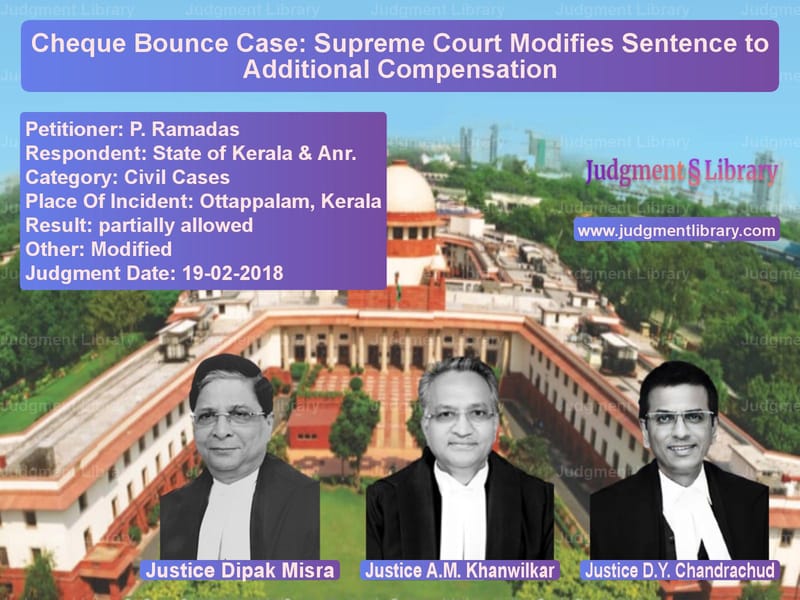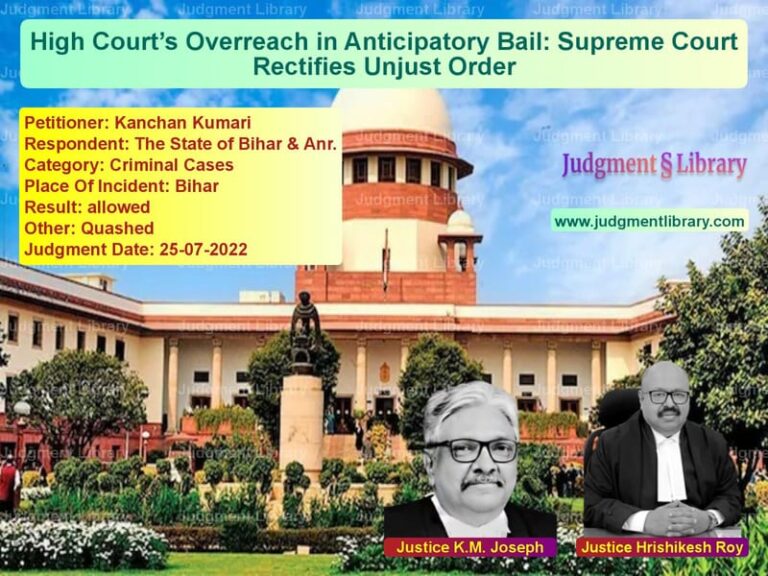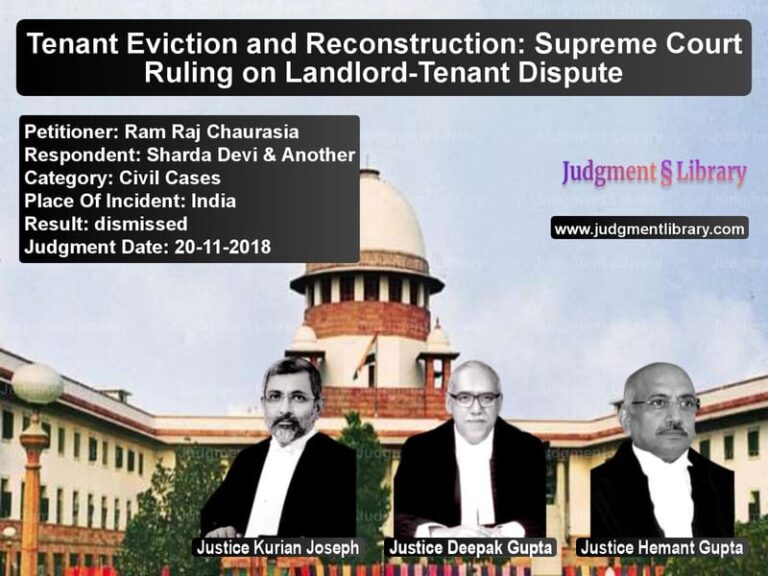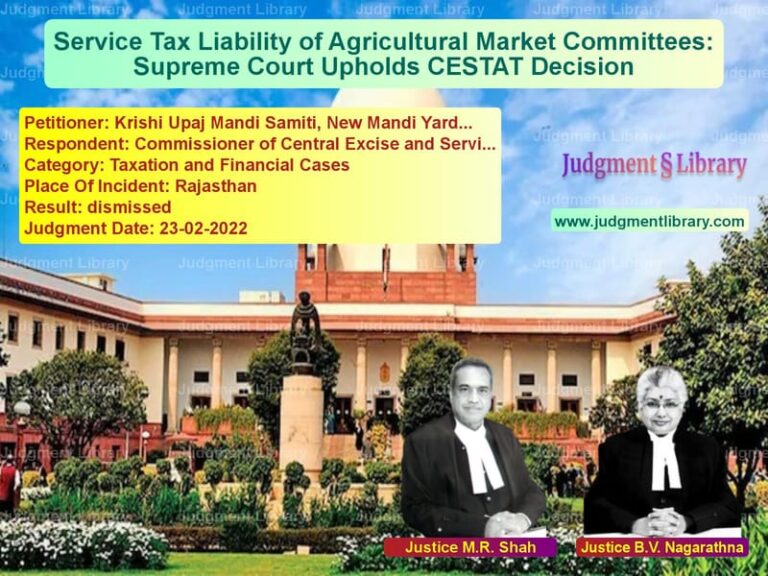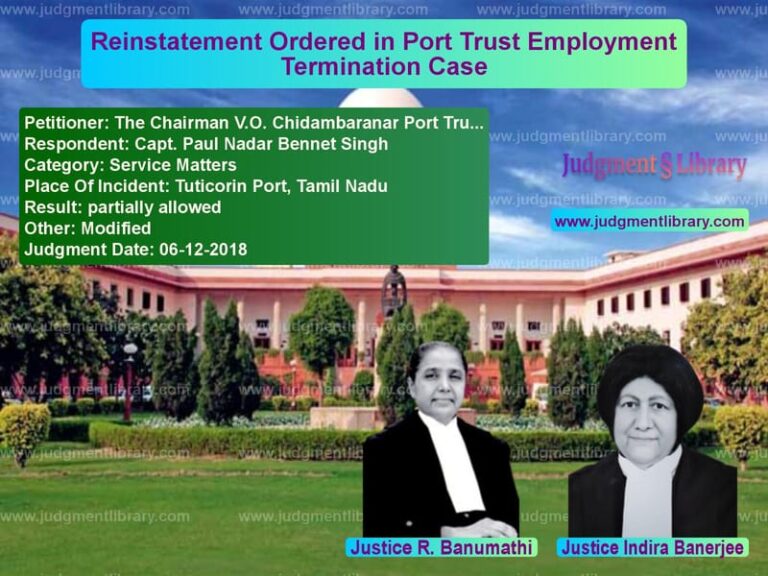Cheque Bounce Case: Supreme Court Modifies Sentence to Additional Compensation
The Supreme Court of India recently ruled in P. Ramadas v. State of Kerala & Anr., addressing a cheque bounce case under Section 138 of the Negotiable Instruments Act, 1881. The Court upheld the conviction but modified the sentence, replacing imprisonment with an additional compensation payment. This judgment highlights the judiciary’s focus on ensuring financial justice rather than merely punishing offenders.
Background of the Case
The case arose from a complaint filed by the respondent under Section 138 of the Negotiable Instruments Act, alleging that the appellant, P. Ramadas, had issued a cheque for Rs. 2,45,000, which was dishonored due to insufficient funds.
The Judicial First Class Magistrate-II, Ottappalam, convicted the appellant and sentenced him to:
- Three months of simple imprisonment.
- Compensation of Rs. 2,45,000 to the complainant under Section 357(3) of the Code of Criminal Procedure, 1973.
- 15 additional days of imprisonment in case of default.
The appellant challenged the conviction before the Additional Sessions Judge, Palakkad Division, but the appeal was dismissed on August 5, 2011. He then approached the Kerala High Court in Criminal Revision Petition No. 3075/2011, which also upheld the conviction and sentence.
Supreme Court Proceedings
Aggrieved by the High Court’s decision, Ramadas approached the Supreme Court through a special leave petition. The Court issued notices to the State of Kerala and the complainant. During the proceedings, the Court was informed that Ramadas had already deposited Rs. 2,45,000 with the trial court.
On January 15, 2018, the Supreme Court directed the appellant to deposit an additional Rs. 1,00,000, stating:
“If the proof of withdrawal is filed before this Court, this Court may consider waiver of the sentence relating to imprisonment.”
On February 5, 2018, Ramadas produced a receipt showing that he had deposited the additional Rs. 1,00,000 in compliance with the order.
Supreme Court’s Analysis
1. Conviction Under Section 138 of the Negotiable Instruments Act
The Supreme Court noted that there was no ground to interfere with the concurrent findings of the trial court, the appellate court, and the High Court regarding the appellant’s guilt. The judgment stated:
“We are of the opinion that it is not possible to interfere with the concurrent finding of fact regarding the finding of guilt recorded against the appellant. Thus, no interference is warranted against the order of conviction.”
2. Modification of Sentence
The Court considered the fact that the appellant had already deposited the compensation amount and had further complied with the Court’s direction to pay an additional Rs. 1,00,000. Observing that the primary objective of Section 138 is to ensure financial compensation rather than imprisonment, the Court ruled:
“Interest of justice would be subserved if the order regarding simple imprisonment of three months is modified, and in lieu thereof, additional compensation of Rs. 1,00,000 already deposited by the appellant before the trial court is directed to be made over to the complainant.”
3. Opportunity for the Complainant
The Court recognized that the complainant had not entered an appearance before it. However, since the modification was beneficial to the complainant, the Court allowed them the option to seek recall of the order if they were dissatisfied.
Supreme Court’s Verdict
The Supreme Court allowed the appeal in part, modifying the sentence as follows:
- The conviction under Section 138 of the Negotiable Instruments Act was upheld.
- The sentence of three months’ imprisonment was replaced with an additional compensation of Rs. 1,00,000.
- The complainant was allowed to withdraw the additional Rs. 1,00,000 deposited before the trial court.
- The complainant was granted liberty to apply for recall if dissatisfied with the order.
Implications of the Judgment
This ruling has significant implications for cheque bounce cases:
- Emphasis on Financial Justice: The Supreme Court prioritized financial restitution over punitive imprisonment, aligning with the legislative intent of Section 138.
- Flexibility in Sentencing: The judgment sets a precedent for replacing short-term imprisonment with enhanced compensation in similar cases.
- Encouragement for Settlements: By allowing additional compensation in lieu of imprisonment, the ruling incentivizes out-of-court settlements in financial disputes.
- Judicial Economy: The approach minimizes the burden on prisons while ensuring justice for victims.
Conclusion
The Supreme Court’s decision in P. Ramadas v. State of Kerala & Anr. reinforces the primary objective of Section 138 of the Negotiable Instruments Act—ensuring financial compensation for dishonored cheques rather than punitive incarceration. By modifying the sentence to favor monetary restitution, the Court has set a precedent for pragmatic and equitable resolutions in cheque bounce cases.
Petitioner Name: P. RamadasRespondent Name: State of Kerala & Anr.Judgment By: Justice Dipak Misra, Justice A.M. Khanwilkar, Justice D.Y. ChandrachudJudgment Date: 19-02-2018
Don’t miss out on the full details! Download the complete judgment in PDF format below and gain valuable insights instantly!
Download Judgment: P. Ramadas vs State of Kerala & An Supreme Court of India Judgment Dated 19-02-2018.pdf
Direct Downlaod Judgment: Direct downlaod this Judgment
See all petitions in Cheque Dishonour Cases
See all petitions in Damages and Compensation
See all petitions in Judgment by Dipak Misra
See all petitions in Judgment by A M Khanwilkar
See all petitions in Judgment by Dhananjaya Y Chandrachud
See all petitions in partially allowed
See all petitions in Modified
See all petitions in supreme court of India judgments February 2018
See all petitions in 2018 judgments
See all posts in Civil Cases Category
See all allowed petitions in Civil Cases Category
See all Dismissed petitions in Civil Cases Category
See all partially allowed petitions in Civil Cases Category

